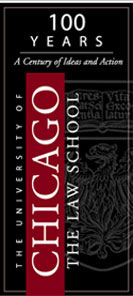|
Extract From
William Twining, Law in Context: Enlarging a Discipline (Oxford
University Press 1997) pp 5-6
“Eventually after a long period of indecision and two terms
standing in for my former tutor at Oxford, I obtained a fellowship
to do postgraduate work at the University of Chicago, mainly under
Karl Llewellyn….
The year in Chicago was a watershed. It began in 1957, shortly
before the launch of the first Sputnik. Although I spent nearly
half my time working with Karl Llewellyn,1
I was fully integrated into the Law School both socially and
intellectually.2 This was toward the end of Edward Levi’s
extraordinary Deanship; in addition to having built up a star-studded
faculty, Chicago was the base for a pioneering clinical programme
and for large scale interdisciplinary work in law and the social
sciences.3 including what later became the Law and Economics movement.
This last was spearheaded by Levi himself and Aaron Director,
shortly to be joined by Ronald Coase and George Stigler.4 I immediately
realized that Director’s political ideas were almost the
reverse of my own and I refused to be pressured into taking his
basic course on economic analysis. This was a political stand
that was almost certainly a strategic mistake. One needs to study
one’s opponents and a grounding in economics should be part
of the equipment of most law teachers. After I had recovered from
the initial culture shock and shed some of my Oxford arrogance,
I realized that this was a more sophisticated, lively and demanding
institution than I had even conceived as possible. The University
of Chicago also provided an alternative model to Oxford of an
institution of higher learning devoted to excellence.5
Conversion to the idea of the American Law School at its best
and to the ideas of Karl Llewellyn at no stage involved a wholesale
rejection of Oxford. It was, after all, largely a capacity to
write English and to study on my own that enabled me to cope with
the pace and the bewildering range of new ideas and experiences
that Chicago offered.6 I was concerned to reconcile and build
on Hart and Llewellyn rather than to choose between them. And
Oxford rather than Chicago had taught me the importance of history.
But this experience both exposed and provided for some key missing
ingredients in my legal education up to then: the linking of law
to the social sciences; a dialectical approach to every issue;
a highly intellectualized but nevertheless realistic approach
to legal practice and the law in action; and a demonstration of
the interdependence of theory and practice; and a concern for
justice.
In September, 1958 I went almost directly from Chicago to the
University of Khartoum….. |



